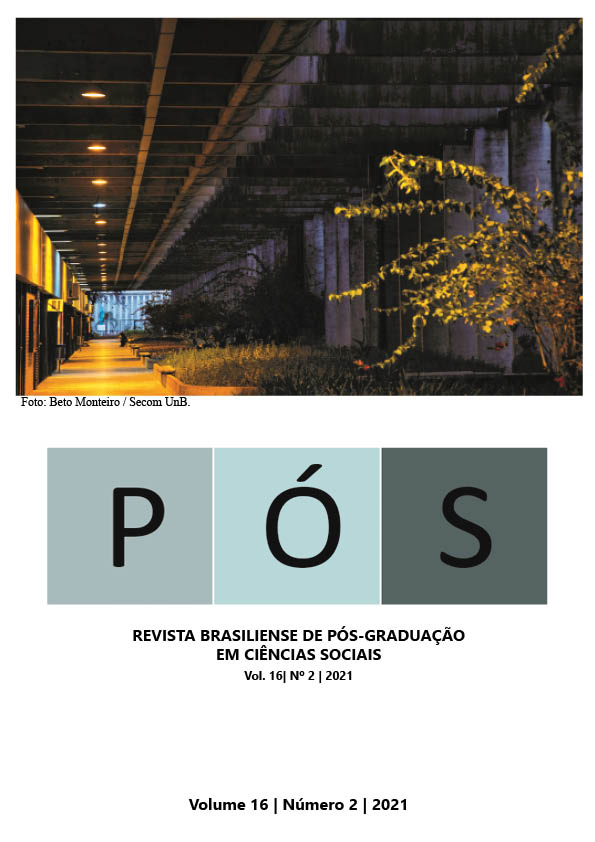And Covid-19 in the Manzo Ngunzo Kaiango Community?
A dialogue on routine, living and subsistence with Makota Kidoialê.
Keywords:
Covid-19, Pandemic, Candomblé, Impacts, Changes in routine.Abstract
In the midst of the pandemic period caused by the SARS-CoV-2 virus, during the year 2020 in the Brazilian context and reflecting on the possibilities of giving continuity to the analyses of the anthropological field paralysed by this atypical moment, it became necessary to use new/other means and methods that respected the tradition and the ways of living of candomblé, considering the physical distance imposed. For these traditions, which are perpetuated and maintained through orality, the spoken word has Ngunzo/Axé/Energy (DIÉNE, 2020). Thus, understanding that knowledge and exchange for candomblé terreiro peoples are acquired through living experience, I exposed to Makota Kidoialê - our interviewee and spokesperson of the remaining Manzo Ngunzo Kaiango quilombo community - the freezing situation to which we were conditioned and the need to continue the research. So I suggested to her the possibility of conducting some interviews in the form of written and/or audio questions to follow up on this period, which she kindly accepted. The pandemic changed, among other things, the dynamics of the collective use of spaces, so intrinsic to these peoples' way of life. Therefore, this dialogue aims to demonstrate that, in addition to the use of masks, the techniques of prevention and survival to Covid-19, before the changes in the routine of socio-spatial interaction and the ritualistic and economic dynamics of the community, vary in each terreiro, because in addition to ancestral medicine intrinsic to all of them, they also have several ways to reinvent themselves in the face of the needs, adversities and violence routinely experienced by these peoples.
Downloads
References
ALERTA: Manzo na luta contra o Coronavírus. Kilombo Manzo,
Disponível em: <http://www.kilombomanzo.org/> Acesso
em: 02/11/2020.
ALMEIDA, Alfredo Wagner Berno de. “Os quilombos e as novas
etnias”. In: Quilombos: identidade étnica e territorialidade. Rio
de Janeiro: Editora FGV, 2002, p. 43-81.
DELEUZE, Gilles; GUATTARI, Félix. Introdução: rizoma. Mil
platôs: capitalismo e esquizofrenia, v. 1, 1995 p. 11-37.
DIÉNE, A.-. A. L. “É minha filha, tudo fui eu quem fiz!”: Reflexões
sobre a Arquitetura intuitiva de Mametu Muiandê. Revista
Calundu, [S. l.], v. 4, n. 1, 2020.
DIÉNE, Aisha – A. L. & AHUALLI, Iyaromi F. Por detrás das
máscaras: a Covid-19 na cosmovisão do Candomblé - Reflexões
sobre cuidados, métodos preventivos e saúde coletiva, 2021,
p.125-135. In: Covid-19, saúde & interdisciplinaridade: o impacto
social que uma crise de saúde pública pode gerar. Série Estudos
Reunidos, Volume 92/ Edlaine Faria de Moura Villela (Org.). -- 1.
ed. -- Jundiaí, SP: Paco.
DIÉNE, Aisha- Angèle Leandro. Arquitetura de terreiro: compreendendo
socioespacialidades na comunidade quilombola Manzo
Ngunzo Kaiango. 2021. 109 f. Dissertação (Mestrado em Antropologia
Social). Universidade de Brasília, Brasília, 2021.
DOUGLAS, M. Purity and Danger: An Analysis of the Concepts
of Pollution and Taboo. London & New York: Taylor & Francis
e-Library, 2001.
LITTLE, Paul. Territórios sociais e povos tradicionais no Brasil:
por uma antropologia da territorialidade. Anuário Antropológico,
v. 28, n. 1, p. 251-290, 2003.
LODY, Raul Giovanni da Motta. O povo do santo: religião, história
e cultura dos orixás, voduns, inquices e caboclos. Martins
Fontes, 2006.
RUFINO, Luiz. Pedagogia das encruzilhadas Exu como Educação.
Revista Exitus, v. 9, n. 4, p. 262-289, 2019.
SIMAS, Luiz Antonio; RUFINO, Luiz. Fogo no mato: a ciência
encantada das macumbas. Mórula Editorial, 2019.
Downloads
Published
How to Cite
Issue
Section
License
Copyright (c) 2021 Pós - Revista Brasiliense de Pós-Graduação em Ciências Sociais

This work is licensed under a Creative Commons Attribution-NonCommercial-NoDerivatives 4.0 International License.














